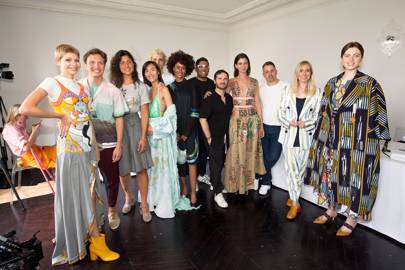On the panel sat Vogue editor-in-chief Edward Enninful, Eco-Age founder Livia Firth, MatchesFashion.com buying director Natalie Kingham, model and philanthropist Petra Nemcova, president of the Italian Chamber of Fashion, Carlo Capasa, and 10 other industry leaders. If it sounds like X Factor for eco-conscious fashion, you’ve got the picture.
Designers, such as Romina Caponi of brand 16R, demonstrated the GCC® principles of sustainable excellence by using recycled and upcyled materials. The sequins on the 16R entry were laser cut using plastic from recycled bottles collected on the beaches of Italy. Others, like Azar Rajabi, used natural methods to treat material, such as tanning leather with rhubarb. Almost all participants pledged to support small communities by sourcing artisan materials and techniques that would potentially die out otherwise. Gilberto Calzolari, in particular, used Brazilian coffee bags purchased from Milan’s Navigli street market as the base of his gown. Once lined with archive fabric and embellished with lead-free Swarovski crystals, the sacks, which are typically used as water barriers to stop canals flooding due to climate change, were unrecognisable.
“The stories were told in such detail,” Firth told Vogue shortly after the presentations. “There are so many emerging designer talent competitions around the world, where judges hear young designers talk about where they studied, and what degree they did. Rarely can designers discuss the materials and the handprint of a dress. That handprint is the most powerful message that came out of yesterday.”

The five brands that will attend the Green Carpet Fashion Awards held at La Scala Theatre on September 23 are Teatum Jones, Gilberto Calzolari, Davide Grillo, Behno and Wrad. Each finalist will receive a 12-month mentorship programme with the Bicester Village Shopping Collection on how to sustain a successful fashion business, and the winner, who will be announced on the night, will have the opportunity to present their designs at Milan Fashion Week in February 2019.
“Being one of the final five is inspiring as it unites us with a community of people fighting to show the true cost of clothing,” Silvia Giovanardi told Vogue after her brand's name, Wrad, had been called out. “This truth is the main driver behind our collective motivation to innovate the current fashion system, putting people and nature back at the centre."
On what the wider industry can learn from the competition, Firth added: “Sustainability is the future of the fashion system. If we don’t educate young designers, then we don’t have any hope of changing the industry from the bottom up." In the 10 years since she has committed to the Green Carpet Challenge and worn sustainable designers on the red carpet, she has proved that eco fashion does not have to look different to what is deemed as "normal" fashion. “I always look at style, I never ever compromise,” she continued. “Style, and then the story behind a dress."

No comments:
Post a Comment